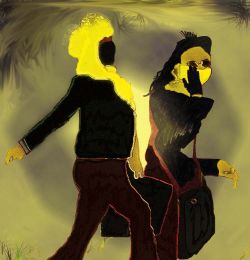The Avant-Garde: Risk Assessment
BLOG POST posted on February 5, 2010 by Stineographer
Is it me, or has the avant-garde ceased to mean much of anything these days? Oh, I know, it's probably just me BUT I'm going to go off on a tangent anyway. Could this lack of meaning be due to the artist's fear of offense? Yes, things are tough all over, and they have been for some time. The artist has to live, and rich people are easily offended. I don't know too many right-wing artists (though I can think of at least ONE). Strangely enough, I do know quite a few left-wing, rich people. They may not consider themselves rich, but they do consider themselves left-wing. I don't know too many right-wingers, but I do surmise that most rich people are right-winged. The real question is: who pays for art? Rich people do tend to be right-winged, but do they buy art? Do rich, right-winged people care about art at all? Well, now my tangent has been off-sided. I guess what I'm trying to say is, if artists are forced to sell art to rich people, and rich people are easily offended then it would seem that many artists (even those considered avant-garde) will do their upmost in order to create art that does not offend. I believe this is a fairly safe assumption.
Lets take a step back to Modernism. Yes, we need experimentation in form. You know why? Because we are still experiencing the same basic human emotions that we've had for millenia. We need art in order to help express these emotions. We need the avant-garde to explore new ways of expressing these emotions, otherwise we'll get tired of telling the same old stories over and over and over again. (Well, that's obviously my humble opinion.) For at least one hundred years now, the avant-garde has been obsessed with formal considerations. This is understandable. The artist has been dependent upon patrons for a very long time. The more patrons an artist has, the more s/he can eat, and prosper, etc. Perhaps formal concerns are easiest to foist upon unsuspecting patrons because they have very little capacity to offend. The only way in which formal creations seem able to offend is through simplicity. I'm thinking of Barnett Newman, here. The thing about rich people who buy art is, they don't care about formal offense. What they really care about is market value. Formal offenses seem to add to the market value of a piece rather than detract from it.
Anyway, what I'm trying to get at here is that artists of the avant-garde have virtually ceased taking any real risks. In part, this is due to a need for survival. Guess what, you're probably more likely to sell more pieces the more formally experimental they are. So where's the risk? The risk is in the content of the piece. And this is where the greyscale really enters into play: politics. If you choose to represent the underrepresented then, I believe, you are taking a risk. You are taking the risk of surprising a vast majority. Another real question here is: can the vast majority (that old, elusive mainstream) still be surprised? Sometimes, the best an artist can do is present a piece that requires the viewer to question assumptions about the world and life in general that had previously gone unchallenged in the viewer's mind. I believe that this is the type of risk that real avant-garde art must take. If the piece does not engage the viewer, if the viewer cannot take any sort of meaning away from the piece then the artist has failed that viewer. Granted, it's very difficult to really engage the vast majority of veiwers (especially these days), but I still believe that the artist has a responsibility to at least try and reach out to people who may not necessarily reach out to art. I believe that a lot of people would embrace art if they had more exposure to it. For some reason, the avant-garde has become associated with elitists. Perhaps this is because a lot of avant-garde work is full of allusions to past artists. Somewhere along the line, people adopted the assumption that in order to understand a really avant-garde piece of art one must have had a university education. This is where I believe the avant-garde has failed. You can make as many allusions as you want to past artists and their work, but if contemporary art is just an in-joke amongst avant-garde artists then it will cease to be relevant to anyone who hasn't spent thousands of dollars and hours learning about art history. If this happens, then how will we ever continue to entice people to learn about art at all?
The site for the Vancouver local of The Media Co-op has been archived and will no longer be updated. Please visit the main Media Co-op website to learn more about the organization.
